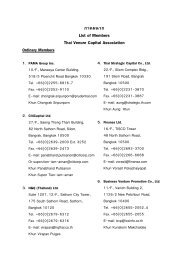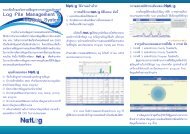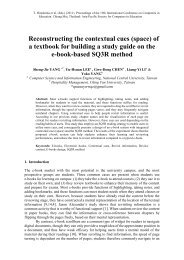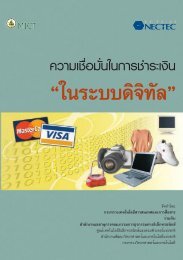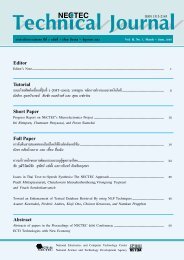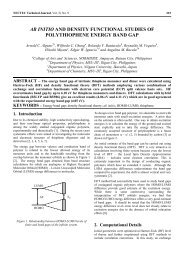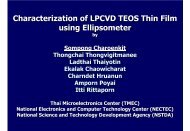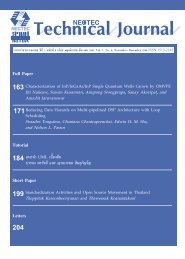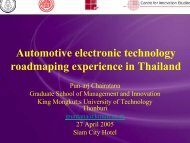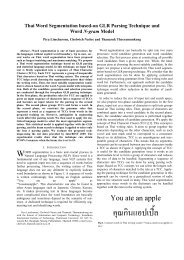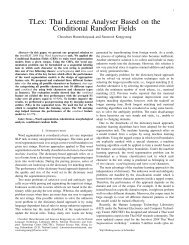Thailand ICT Master Plan (2002-2006). - Nectec
Thailand ICT Master Plan (2002-2006). - Nectec
Thailand ICT Master Plan (2002-2006). - Nectec
You also want an ePaper? Increase the reach of your titles
YUMPU automatically turns print PDFs into web optimized ePapers that Google loves.
(2) Encourage collaboration between local and foreign entrepreneurs in softwareprojects in the government sector in order to transfer skills and knowledgeto Thai people.1.4 To develop an evaluation system and appropriate indicators in order to assess thework of and impacts from SIPA on the economy and society.1.5 To develop a 10-year master plan for <strong>ICT</strong> human resource development, focusing onboth qualitative and quantitative dimensions. In the plan, the development of softwarepersonnel receives high priority, with the following principles:(1) Establishing a joint policy committee comprising the government, industryand education sectors to develop a master plan for human resourcedevelopment to meet the demand of the software industry.(2) Developing lecturers and software researchers with greater knowledge andexperience in the software industry, aiming to double the number within five years.(3) Setting up a professional training institute to urgently train qualified softwarepersonnel, with emphasis on relevant professional certifications. In order toachieve better effectiveness and efficiency, the institute should be run andmanaged by the private sector, with partial investment support and taxincentives from the government. The training is a two-prong approach: one toenhance the skills of current software personnel, and the other to provide non-<strong>ICT</strong> graduates necessary skills to take an active part in the software industry.(4) Conducting a survey on the availability and type of existing instructors,researchers, and software personnel in the software business, anddeveloping a mechanism to attract foreign experts to work with local peoplein educational, training and operational matters.(5) Building a collaborative university-industry network in the following key areas:• Setting up the mechanism to provide the opportunity for students to workin software companies during or at the end of the course. Private sectorexpenses incurred in this regard will be recouped through tax incentives.• Exchanging of personnel among those in the <strong>ICT</strong> industry, the softwarebusiness and the education sector by allowing for a sabbatical leave towork on specified program or project(s).(6) Provision of funds for <strong>ICT</strong> human resource development, particularly for thesoftware industry, which include converting other profession to work in the <strong>ICT</strong>industry. This may involve financial institutions offering low-interest loans.8<strong>Thailand</strong> <strong>ICT</strong> <strong>Master</strong> <strong>Plan</strong> (<strong>2002</strong>-<strong>2006</strong>)



